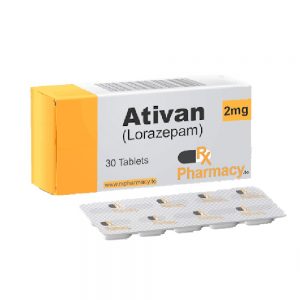Ativan, also known as lorazepam, is a benzodiazepine drug. Benzodiazepines are commonly prescribed to treat anxiety disorders, muscle relaxants, sleeping aid, pre-anaesthetic drugs, and anticonvulsant drugs. Benzodiazepines are also referred to as tranquilizers or sedatives. Other drugs that fall in this category include Halcion, Xanax, Ambien, Klonopin, Lunesta, phenibut, and Valium.
Ativan has the following effects on the body system when ingested:
- Reduced chance of experiencing a seizure.
- Increased relaxation together with less behavioural inhibitions; and
- Reduced anxiety or nervousness.
It is typically used to treat anxiety disorders such as:
- Social anxiety triggered by social interactions with other people
- Agoraphobia is triggered by a severe fear of being in open spaces and may cause a person to refuse to leave their homes
- Panic disorders are triggered by experiencing repetitive panic attacks
- Phobias
- Pre-anaesthetic anxiety is triggered right before a person is given general anaesthesia before undergoing surgery.
How Does Ativan Work?
 Benzodiazepines such as Ativan are in the positive allosteric modulator class of drugs. These drugs directly affect the brain’s neurons that use the GABA neurotransmitter. GABA stands for Gamma-aminobutyric acid and is present throughout the spinal cord and the brain. Therefore, when Ativan is ingested, it indirectly affects the GABA neurotransmitter in the brain. The affected GABA neurotransmitter becomes inhibitory, and it affects the other brain neurons. This makes the brain perform its functions slower.
Benzodiazepines such as Ativan are in the positive allosteric modulator class of drugs. These drugs directly affect the brain’s neurons that use the GABA neurotransmitter. GABA stands for Gamma-aminobutyric acid and is present throughout the spinal cord and the brain. Therefore, when Ativan is ingested, it indirectly affects the GABA neurotransmitter in the brain. The affected GABA neurotransmitter becomes inhibitory, and it affects the other brain neurons. This makes the brain perform its functions slower.
Ativan works as a GABA agonist meaning that it targets the brain neurons that have receptors and binds to them. This makes the other neurons in the spinal cord release GABA. When GABA is released in the brain, the production of the other neurons reduces, which reduces the activity in the central nervous system. This reduces anxiety, increases relaxation, and causes drowsiness.
Furthermore, GAMA is concentrated in the brain, so the effects of ingesting Ativan are felt throughout the body. It affects both physical and cognitive functions. For example, it affects the reaction time, memory, and attention of the person.
Ativan directly affects the brain and body, which means it has the same effect whether ingested in high or small amounts. The results of Ativan are felt slower and last longer than that of its fellow Benzodiazepines like Xanax. This means that it is typically used as a longer-term treatment option. To prevent dependency, doctors mainly prescribe it for treatment for three to four months.
How Addictive Is Ativan?
Benzodiazepines have been known to make people dependent and addicted. Ativan is prescribed for specific therapeutic reasons, but its chemical structure makes it prone to addiction and physical dependence. Ativan is very potent in comparison to other Benzodiazepine drugs. This makes it faster and easier to develop a tolerance in contrast to other Benzodiazepines. This high potency makes the person create cravings that make the person increase their intake of Ativan.
Side Effects of Ingesting Ativan
Even though Ativan is used to treat psychological disorders, it still has some adverse effects on the body. These effects are attributed to its potency and addictive properties. Once a person gives in to their cravings, they build their tolerance. Once a person produces their patience, they will have to increase their dosage to get the same effect experienced before. This creates a dependency that makes a person in addiction recovery experience withdrawal symptoms when they have limited/no access to Ativan. The possible withdrawal symptoms include:
 Loss of appetite
Loss of appetite- Increased heart rate, also known as tachycardia
- Dizziness
- Increased depression and anxiety
- Restlessness, irritability, and insomnia
- Flu-like symptoms
- Vomiting and nausea
- Tingling and numbness of toes, fingers, feet, or hands
It is easy to confuse the withdrawal symptoms with those of a person experiencing an anxiety disorder. Therefore, when a person in addiction recovery experiences the withdrawal symptoms, they tend to misinterpret this and increase their dosage of Ativan. This misinterpretation results in abuse and addiction of Ativan. When taken in high doses or mixed with other depressants like opioids or alcohol, it can cause the following side effects:
- Memory impairment
- Seizures
- Loss of consciousness
- Excessive sedation
- Tremors
- Respiratory depression
Recognizing Ativan Addiction
 Recognizing addiction to prescription drugs is not easy. Since abuse of Ativan is done behind closed doors, it can go unnoticed for a long time. To know if someone is an addict, you will have to look for psychological and physical dependence. Keep a lookout for withdrawal symptoms and tolerance. This means that they will have to take more of the drug to feel its effects.
Recognizing addiction to prescription drugs is not easy. Since abuse of Ativan is done behind closed doors, it can go unnoticed for a long time. To know if someone is an addict, you will have to look for psychological and physical dependence. Keep a lookout for withdrawal symptoms and tolerance. This means that they will have to take more of the drug to feel its effects.
Cravings are a sure sign of dependence and addiction. The cravings are felt when taking the drug or after the person in addiction recovery has stopped using the medicine. Another red flag is a lack of responsibility and interest in social relationships. The person in addiction recovery will be obsessed with getting the drug, and nothing else will matter to him other than the Ativan.
The withdrawal symptoms become more severe if a person in addiction recovery uses it for long under high dosages. A medical treatment program can help reduce the effects of withdrawal. The program also teaches the skills needed to cope after the person leaves the facility. This increases the chances of success.
If you or your loved one is experiencing Ativan addiction, seek the help of a professional or drug rehab facility. Look into your drug rehab options and think about enrolling in a program. You need to be assessed by a professional to narrow down on what you need. Some people struggling with addiction know that they have a problem, while some are in denial.
If your loved one falls in the latter category, you can stage an intervention and help them understand that they need help. This may require you to talk to the person in addiction recovery about the addiction, inform them about their treatment options, and tell them about the side effects of their addiction. The available treatment options that you can try are:
- Dialectical behaviour therapy
- Cognitive-behavioural therapy
- Contingency management interventions
- Motivational enhancement therapy
- Community reinforcement approach